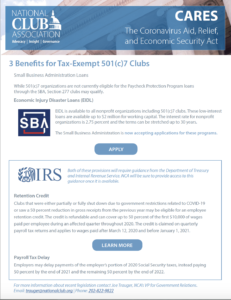President Biden has signed into law the “American Rescue Plan,” which is the latest in Congress’ efforts to bolster the economy in response to the now year-long coronavirus pandemic. Over the past year, the National Club Association has been working with representatives and senators on both sides of the aisle to address key priorities for the club community. Early in the pandemic, NCA identified and advocated for three policy priorities: extension and enhancement of the Employee Retention Tax Credit (ERTC), expansion of the Paycheck Protection Program (PPP), and increased state and local aid. With enactment of the American Rescue Plan, all three of these priorities were addressed. In addition, the American Rescue Plan established a new grant program for restaurants and bars, which may be available to clubs licensed as such.
Employee Retention Tax Credit
The American Rescue Plan builds upon the extension and enhancement of the ERTC achieved in December by continuing the program through the end of 2021. The refundable tax credit against payroll taxes amounts to 70 percent of the first $10,000 in eligible wages per employee, per quarter for a maximum credit of $7,000 per employee, per quarter. The credit is available to businesses who meet one of two eligibility tests:
- Have operations that were fully or partially suspended during any calendar quarter due to orders from an appropriate governmental authority limiting commerce, travel or group meetings due to COVID-19; or
- Experienced a significant decline in gross receipts during the calendar quarter.
Paycheck Protection Program
The American Rescue Plan expands eligibility for the PPP by including all 501(c) organizations, including 501(c)(7) clubs that do not fall under Small Business Administration regulations barring the participation of private clubs that limit their membership for reasons other than capacity. The PPP loan program provides forgivable, low-interest loans to businesses to pay for expenses such as rent, mortgage, wages and other expenses. While the program has been opened up, the program is set to expire on March 31, 2021, unless Congress extends the deadline. NCA has joined the U.S. Chamber of Commerce in requesting additional time for applications to be submitted.
Restaurant Revitalization Program
The American Rescue Plan establishes a new grant program for licensed restaurants and bars that have been impacted by COVID-19. The legislation sets aside $28.6 billion for the Restaurant Revitalization Fund and allows businesses to determine losses through a simple calculation of revenues in 2020 compared to similar quarters in 2019. Guidelines for the new program have not been established, so additional information on this new relief should be available in the coming weeks.
State and Local Assistance
The impact of the pandemic on state and local budgets have been a concern of NCA and allied organizations over the course of the past year. While some state and local budgets appear to have weathered much of the impact, our concerns have been centered on the potential pressure local officials may feel to raise taxes and fees to backfill budget shortfalls. By providing a total of $360 billion in assistance for state and local governments to meet the increased costs and declining revenue from the pandemic, Congress has taken much of this pressure off local officials.
For additional information on COVID-19 relief, please contact NCA Vice President of Government Relations Joe Trauger at 202-822-9822 or [email protected] or visit the Coronavirus Resource Center at coronavirus.nationalclub.org.


